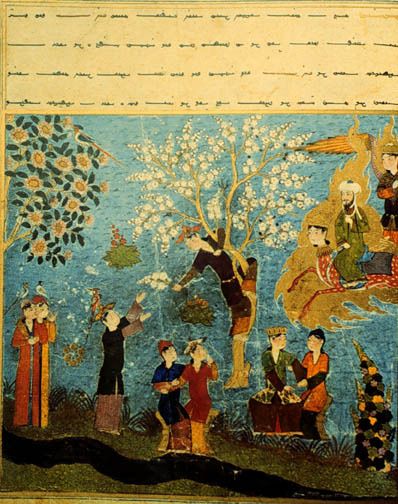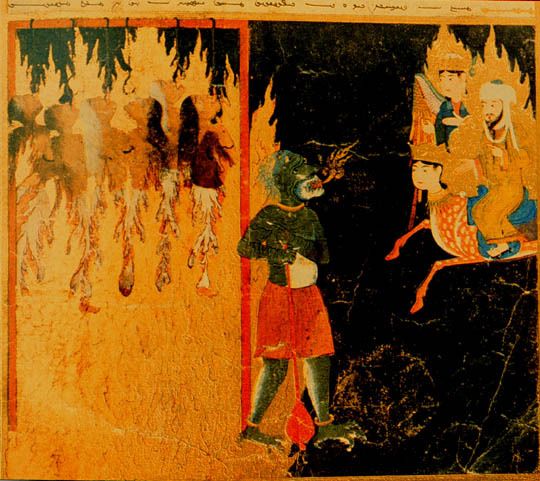Why is this important?
Belief Systems, right or wrong, true or false, direct lives and societies.A word about belief systems.
Our beliefs are constantly evolving. What worked for us as children at home doesn’t always work with neighbors or when we started school. Result = a new belief system. In time we give up the tooth fairy, the Easter Bunny, and Santa Claus.
Problems at work and church modify our beliefs. Reality happens.
We have Free Agency to do anything we want.
We are not free of the consequences.
Gravity doesn’t care whether you have been good or bad.
When our present belief system fails in drastic situations we tend to fall back to a previous belief system.
DELETED
I think most RTH readers are well acquainted with the Christian and Jewish ideas about heaven and hell, but few have encountered the Muslim concepts.
Perhaps you have come across “The Miraculous Journey of Mahomet.”

Paradise

Women hanging by their tongues in Hellfire.
The Koran, or Qur’an if you prefer, has much to say on Jannah (paradise) and Hellfire; but on equal footing are the
Hadiths, the collected sayings of Mohammad, and the scholars commentaries on them.
en.wikipedia.org/wiki/HadithI. From Al-Nawawi (1234-1277) Forty Hadiths and Commentary By Dr. Jamal Ahmed Badi
(Differs from the Original Text from the Arabic Virtual Translation Center):
Page 21 - Hadith 4
Abu 'Abd al-Rahman 'Abdullah bin Mas'ud, radiyallahu 'anhu, reported: The Messenger of Allah,
sallallahu 'alayhi wasallam, the most truthful, the most trusted, told us:
"Verily the creation of any one of you takes place when he is assembled in
his mother's womb; for forty days he is as a drop of fluid, then it becomes
a clot for a similar period. Thereafter, it is a lump looking like it has been
chewed for a similar period. Then an angel is sent to him, who breathes
the ruh (spirit) into him.
This Angel is commanded to write Four decrees:
that he writes down his provision (rizq), his life span, his deeds, and
whether he will be among the wretched or the blessed.I swear by Allah - there is no God but He - one of you may perform the
deeds of the people of Paradise till there is naught but an arm's length
between him and it, when that which has been written will outstrip him so
that he performs the deeds of the people of the Hell Fire; one of you may
perform the deeds of the people of the Hell Fire, till there is naught but an
arm's length between him and it, when that which has been written will
overtake him so that he performs the deeds of the people of Paradise and
enters therein."
[Al-Bukhari & Muslim]
Background:This hadith was not only recorded by Al-Bukhari and Muslim but by other Scholars as well. Apart from 'Abdullah bin Mas'ud, this hadith was also narrated by many other companions (Sahabahs).
P. 25 - “We are responsible for what we choose and for what we do. Referring to the last section of this hadith where a person's final destiny changes at the last minute and he ends up not as expected, there are examples in the Sirahs where some people embrace Islam in the last minute - e.g. they embrace Islam and go into battle and die, some of them not having done a single good deed.
There are also many examples today where non-practicing Muslims or those doing bad deeds, having reached the last stages of their lives (at the age of 50 or 60), will repent and turn into a good Muslim. The same applies for thousands of new converts every year. These people, according to the will of Allah, will be forgiven and enter Paradise.
For the other scenario where a person performs good deeds most of his/her life and at the end of his/her life perform bad deeds deserving to enter the Hellfire (as mentioned in the hadith), this situation affects only a limited number of people compared to the first one. And it is because of the person himself, such as in the case of hypocrites.”
P.28 - “It is narrated by the Prophet, sallallahu 'alayhi wasallam, in one Hadith that Allah created a man on an island where he was the only person there. Allah gave the man rizq by providing fruits on which he survived. For 70 years the man lived and worshipped only Allah, as there were no challenges there. When the time came for the man to die, Allah commanded the angel to bring his soul to Him. Allah asked the man, "O My servant, to Paradise or to Hellfire?" The man replied, "O Allah, Almighty, to Paradise." Allah said, "O My servant, is it because of My Mercy or is it because of your amal (good deeds)?" The man replied, "O Allah, it is because of my amal. For 70 years I worshipped you. I have done nothing bad, only good deeds worshipping you."
Then Allah commanded his angel to take the bounty of sight and put it on one scale. He then commanded the angel to put the man's 70 years' worth of good deeds on the other scale. The bounty of sight weighed heavier than the deeds of 70 years.
In summary, if for 70 years we were to worship Allah and do good deeds and refrain from bad deeds, we will still not be able to repay Allah for one of His bounties. The Scholars say if you want to know Allah's bounty on you, close your eyes. If we close our eyes and imagine that we can no longer see and try to picture how our life would be, only then can we truly appreciate and value the mercy of Allah.
PP. 77-78 “The responsibility of the Muslim regarding what he says is mentioned in the Qur'an:
"Not a word does he utter but there is a watcher by him ready to record it"
[Surah Qaf (50): ayat 18].
- 78 -
There are also other hadiths which state that the Muslim should be careful about what he says. His words can either, if they are pleasing to Allah, raise him to a higher level; or if his words displease Allah, they may cause him to be thrown into the Hellfire - as stated in a hadith recorded by Imam al-Bukhari. This shows that what we say can have a direct effect on whether it will benefit us or not.
One hadith (which illustrates the example of a bad consequence resulting from what a person says) states that the Prophet, sallallahu 'alayhi wasallam, said that a pious man from Bani Israel use to see his fellow man always committing sins. On day the pious man swore to the sinner: "By Allah, He will never forgive you." Allah was displeased with what the pious man said because
only Allah knows what is our destiny, whether someone will end up in Paradise or Hell. Because of this, when the two men died, the pious man was punished and put into Hell and the sinner was forgiven by Allah. [Sunan Abu Daud]
What we can learn here is that either we say something beneficial and good or else we should keep silent.
P. 88 “The hadith mentions one way of dealing nicely or being merciful with animals and that is in the case of slaughtering. In another hadith the Prophet, sallallahu 'alayhi wasallam, said: “Whoever shows mercy even when slaughtering a bird, Allah will have mercy on him on the Day of Judgement.” [Recorded by Al-Bukhari]
In another hadith, the Prophet, sallallahu 'alayhi wasallam, related this story: “While a man was traveling, he felt very thirsty. He found a well and went down to have a drink. When he came out he found a thirsty dog. He said to himself, "This dog is as thirsty as I was." He then went back inside the well and used his shoe to bring out some water for the dog. Allah was pleased with him and forgave his sins because of he had done." [Recorded by Al-Bukhari]
In other hadiths the Prophet, sallallahu 'alayhi wasallam, warns us not to frighten animals. While he was with his companions he found a bird making a greaving sound. The Prophet, sallallahu 'alayhi wasallam, immediately said: “Who has frightened this bird by taking its offspring?” Then he commanded: “Return back her offspring.”
In another hadith the Prophet, sallallahu 'alayhi wasallam, warned Muslims not to harm animals. He said: “A lady was put into the hellfire because of a cat. She tied up the cat and did not give her anything to eat nor did she allow it to look for food.”
*********************
II. From “Forty Hadith - Qudsi”It was related by al-Bukhari, Muslim, at-Tirmidhi and Ibn Majah.
Hadith Qudsi 38:
On the authority of Abu Hurayrah (may Allah be pleased with him), who said that the Messenger of Allah (PBUH) said:
When Allah created Paradise and Hell-fire, He sent Gabriel to Paradise, saying: Look at it and at what I have prepared therein for its inhabitants. The Prophet (pbuh) said: So he came to it and looked at it and at what Allah had prepared therein for its inhabitants. The Prophet (pbuh) said: So he returned to Him and said: By your glory, no one hears of it without entering it. So He ordered that it be encompassed by forms of hardship, and He said: Return to it and look at what I have prepared therein for its inhabitants. The Prophet (pbuh) said: So he returned to it and found that it was encompassed by forms of hardship (1). Then he returned to Him and said: By Your glory, I fear that no one will enter it. He said: Go to Hell-fire and look at it and what I have prepared therein for its inhabitants, and he fount that it was in layers, one above the other. Then he returned to Him and said: By Your glory, no one who hears of it will enter it. So He ordered that it be encompassed by lusts. Then He said: Return to it. And he returned to it and said: By Your glory, I am frightened that no one will escape from entering it.
(1) The Arabic word used here is "makarih", the literal meaning of which is "things that are disliked". In this context it refers to forms of religious discipline that man usually finds onerous.
It was related by Tirmidhi, who said that it was a good and sound Hadith (also by Abu Dawud and an-Nasa'i).
Hadith Qudsi 39:
On the authority of Abu Sa'id al-Khudri (may Allah be pleased with him), who said that the Messenger of Allah (PBUH) said:
Paradise and Hell-fire disputed together, and Hell-fire said: In me are the mighty and the haughty. Paradise said: In me are the weak and the poor. So Allah judged between them, [saying]:
You are Paradise, My mercy; through you I show mercy to those I wish. And you are Hell-fire, My punishment; through you I punish those I wish, and it is incumbent upon Me that each of you shall have its fill.